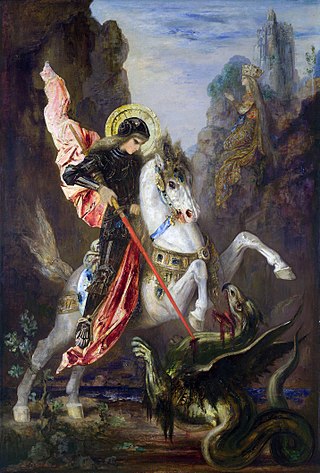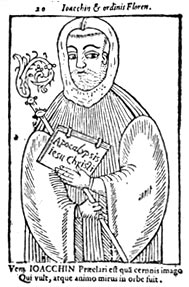Christian eschatology is a minor branch of study within Christian theology which deals with the doctrine of the "last things", especially the Second Coming of Christ, or Parousia. The word eschatology derives from two Greek roots meaning "last" (ἔσχατος) and "study" (-λογία) – involves the study of "end things", whether of the end of an individual life, of the end of the age, of the end of the world, or of the nature of the Kingdom of God. Broadly speaking, Christian eschatology focuses on the ultimate destiny of individual souls and of the entire created order, based primarily upon biblical texts within the Old and New Testaments. Christian eschatology looks to study and discuss matters such as death and the afterlife, Heaven and Hell, the Second Coming of Jesus, the resurrection of the dead, the rapture, the tribulation, millennialism, the end of the world, the Last Judgment, and the New Heaven and New Earth in the world to come.

Christian mythology is the body of myths associated with Christianity. The term encompasses a broad variety of legends and narratives, especially those considered sacred narratives. Mythological themes and elements occur throughout Christian literature, including recurring myths such as ascending a mountain, the axis mundi, myths of combat, descent into the Underworld, accounts of a dying-and-rising god, a flood myth, stories about the founding of a tribe or city, and myths about great heroes of the past, paradises, and self-sacrifice.

Gnosticism is a collection of religious ideas and systems that coalesced in the late 1st century AD among Jewish and early Christian sects. These various groups emphasized personal spiritual knowledge (gnosis) above the proto-orthodox teachings, traditions, and authority of religious institutions.
Millennialism or chiliasm is a belief which is held by some religious denominations. According to this belief, a Messianic Age will be established on Earth prior to the Last Judgment and the future permanent state of "eternity".

Robert Anton Wilson was an American author, futurist, psychologist, and self-described agnostic mystic. Recognized within Discordianism as an Episkopos, pope and saint, Wilson helped publicize Discordianism through his writings and interviews. In 1999 he described his work as an "attempt to break down conditioned associations, to look at the world in a new way, with many models recognized as models or maps, and no one model elevated to the truth". Wilson's goal was "to try to get people into a state of generalized agnosticism, not agnosticism about God alone but agnosticism about everything."

The Illuminatus! Trilogy is a series of three novels by American writers Robert Shea and Robert Anton Wilson, first published in 1975. The trilogy is a satirical, postmodern, science fiction–influenced adventure story; a drug-, sex-, and magic-laden trek through a number of conspiracy theories, both historical and imaginary, related to the authors' version of the Illuminati. The narrative often switches between third- and first-person perspectives in a nonlinear narrative. It is thematically dense, covering topics like counterculture, numerology, and Discordianism.
"Fnord" is a word coined in 1965 by Kerry Thornley and Greg Hill in the Discordian religious text Principia Discordia. It entered into popular culture after appearing in The Illuminatus! Trilogy (1975) of novels written by Robert Shea and Robert Anton Wilson. Here, the interjection "fnord" is given hypnotic power over the unenlightened, and children in grade school are taught to be unable to see the word consciously. For the rest of their lives, every appearance of the word subconsciously generates a feeling of unease and confusion which prevents rational consideration of the text in which it appears.
Millenarianism or millenarism is the belief by a religious, social, or political group or movement in a coming fundamental transformation of society, after which "all things will be changed". Millenarianism exists in various cultures and religions worldwide, with various interpretations of what constitutes a transformation.

Eric Voegelin was a German-American political philosopher. He was born in Cologne, and educated in political science at the University of Vienna, where he became an associate professor of political science in the law faculty. In 1938, he and his wife fled from the Nazi forces which had entered Vienna. They emigrated to the United States, where they became citizens in 1944. He spent most of his academic career at Louisiana State University, the Ludwig Maximilian University of Munich and the Hoover Institution of Stanford University.
In Christian eschatology, postmillennialism, or postmillenarianism, is an interpretation of chapter 20 of the Book of Revelation which sees Christ's second coming as occurring after the "Millennium", a messianic age in which Christian ethics prosper. The term subsumes several similar views of the end times, and it stands in contrast to premillennialism and, to a lesser extent, amillennialism.
Premillennialism, in Christian eschatology, is the belief that Jesus will physically return to the Earth before the Millennium, heralding a literal thousand-year messianic age of peace. Premillennialism is based upon a literal interpretation of Revelation 20:1–6 in the New Testament, which describes Jesus's reign in a period of a thousand years.

Illuminati is a card game made by Steve Jackson Games (SJG), inspired by the 1975 book The Illuminatus! Trilogy, by Robert Anton Wilson and Robert Shea. The game has ominous secret societies competing with each other to control the world through various means, including legal, illegal, and even mystical. It was designed as a "tongue-in-cheek rather than serious" take on conspiracy theories. It contains groups named similarly to real-world organizations, such as the Society for Creative Anachronism and the Symbionese Liberation Army. It can be played by two to eight players. Depending on the number of players, a game can take between one and six hours.
The 23 enigma is a belief in the significance of the number 23. The concept of the 23 enigma has been popularized by various books, movies, and conspiracy theories, which suggest that the number 23 appears with unusual frequency in various contexts and may be a symbol of some larger, hidden significance. A topic related to the 23 enigma is eikositriophobia, which is the fear of the number 23.

Joachim of Fiore, also known as Joachim of Flora, was an Italian Christian theologian, Catholic abbot, and the founder of the monastic order of San Giovanni in Fiore. According to theologian Bernard McGinn, "Joachim of Fiore is the most important apocalyptic thinker of the whole medieval period." The Divine Comedy of Dante Alighieri is one of the most famous works possibly inspired by his ideas. Later followers, inspired by his works in Christian eschatology and historicist theories, are called Joachimites. On June 27, 2024, Pope Francis, in his message for the World Day of Creation, quoted Joachim of Fiore as saying that he "Joachim was able to propose the ideal of a new spirit" and thus marks a turning point in history, as this had never happened before in more than eight centuries since the death of the Florensis monk.

Amillennialism or amillenarism is a chillegoristic eschatological position in Christianity which holds that there will be no millennial reign of the righteous on Earth. This view contrasts with both postmillennial and, especially, with premillennial interpretations of Revelation 20 and various other prophetic and eschatological passages of the Bible.

Ewige Blumenkraft is given in Robert Shea and Robert Anton Wilson's 1975 Illuminatus! Trilogy as a slogan or password of the Illuminati.

Founded by Adam Weishaupt in Bavaria in 1776, the Illuminati have been referred to in popular culture, in books and comics, television and films, and games. A number of novelists, playwrights and composers are alleged to have been Illuminati members and to have reflected this in their work. Early conspiracy theories surrounding the Illuminati have inspired various creative works, and continue to do so.
Gnosticism in modern times includes a variety of contemporary religious movements, stemming from Gnostic ideas and systems from ancient Roman society. Gnosticism is an ancient name for a variety of religious ideas and systems, originating in Jewish-Christian milieux in the first and second century CE.

The Principia Discordia is the first published Discordian religious text. It was written by Greg Hill with Kerry Wendell Thornley and others. The first edition was printed using Jim Garrison's Xerox printer in 1963. The second edition was published under the title Principia Discordia or How The West Was Lost in a limited edition of five copies in 1965. The phrase Principia Discordia, reminiscent of Isaac Newton's 1687 Principia Mathematica, is presumably intended to mean Discordant Principles, or Principles of Discordance.











